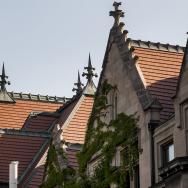Prof. Margaret Gardel was awarded the prestigious Raymond and Beverly Sackler International Prize in Biophysics, which recognizes distinguished scientists under age 45 who have made outstanding and fundamental contributions in their fields.
An international committee selected Gardel as one of the two 2020 awardees of the Sackler Prize, which promotes originality and excellence of research in the field of biophysics. Her work investigates how cells sense mechanical forces and respond to those forces with chemical activity.
“It’s great to be honored by colleagues,” said Gardel, the Horace B. Horton Professor of Physics and Molecular Engineering. “For me, it reflects the approaches that we’ve been building in my lab over the past 13 years to establish new biophysical tools to understand cell mechanics. I thank the University of Chicago for providing a supportive environment for our lab to be able to do this research.”
“Margaret has made significant contributions to the field of biophysics, and this recognition is well deserved,” said Matthew Tirrell, dean of the Pritzker School of Molecular Engineering. “I look forward to seeing how her innovative work continues to help us better understand how cellular organisms move and change shape, and how some of this work may provide insight into designing new synthetic materials.”
For example, one of Gardel’s recent studies re-created how cells divide—outside a cell.
“The mechanisms that allow organisms to move and change shape are inherent to life, and they are all underlaid by physics,” said Gardel, who directs the NSF-funded Material Research Science and Engineering Center. “But despite how central they are for our understanding of biology, a great deal of these remain poorly understood.”
The Raymond and Beverly Sackler International Prize in Biophysics is administered by Tel Aviv University. It was established to encourage dedication to science, originality and excellence. This year an amount of $50,000 will be shared equally between Gardel and Prof. Robert Best from the National Institutes of Health.

